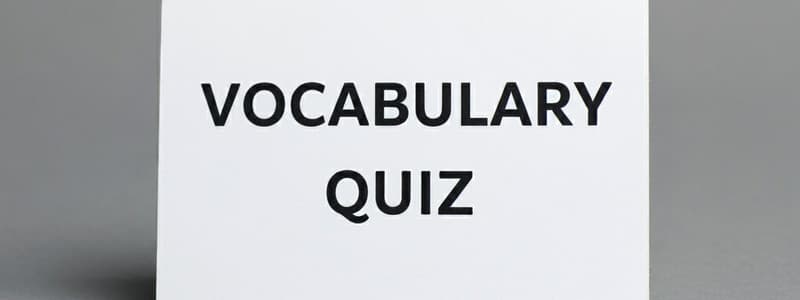Podcast
Questions and Answers
Which word describes someone who has good manners and is respectful?
Which word describes someone who has good manners and is respectful?
- Rude
- Polite (correct)
- Loose
- Blunt
What is the opposite of 'deep'?
What is the opposite of 'deep'?
shallow
Match the following words with their correct definitions:
Match the following words with their correct definitions:
Ordinary = Common; not special or unique Unusual = Not common or typical Wise = Having or showing experience and good judgment Blunt = Not sharp; direct in manner often to the point of being rude
Which word means 'not common or typical'?
Which word means 'not common or typical'?
Which word can describe a person who has a lot of experience and good judgment?
Which word can describe a person who has a lot of experience and good judgment?
Which word best describes clothing that is not tight to wear?
Which word best describes clothing that is not tight to wear?
Which of the following word is the opposite of 'deep' ?
Which of the following word is the opposite of 'deep' ?
Study Notes
Opposites and Contrasts
-
Ordinary refers to things or actions that are common and expected, while unusual describes things that are rare and stand out from the norm.
-
Wise individuals exhibit good judgment, knowledge, and experience, making them capable of making sound decisions. In contrast, foolish actions are driven by a lack of good sense and judgment, often leading to negative consequences.
-
Sharp implies a keen edge, intelligence, or quick wit, while blunt suggests a lack of sharpness, directness, and sometimes rudeness in communication.
-
Deep describes something that extends far down, indicating depth of understanding. In contrast, shallow references a lack of depth, suggesting superficiality or a lack of understanding.
Manners and Behavior
- Polite behavior is characterized by good manners, respect, and consideration for others. On the other hand, rude behavior is offensively impolite and disrespectful, often causing discomfort to others.
Physical States and Metaphors
- Loose implies something is not tightly fixed or confined, signifying freedom or relaxation. Tight suggests a firm grip, constrained state, or strictness.
Ordinary vs Unusual
- Ordinary describes something common, not special or unique. Example: A regular pasta dish is considered ordinary.
- Unusual describes something rare or atypical. Example: Snow in April is unusual in many parts of the world.
Wise vs Foolish
- Wise implies having good judgment, experience, and knowledge. Example: A wise person offers insightful advice.
- Foolish describes a lack of good sense and judgment. Example: Investing all savings in one venture is often considered foolish.
Sharp vs Blunt
- Sharp suggests a pointed edge or keen intelligence. Example: A sharp mind easily grasps complex ideas.
- Blunt describes a lack of sharpness, both physically and metaphorically. Example: Blunt comments are direct, sometimes to the point of rudeness.
Deep vs Shallow
- Deep refers to physical depth or profound understanding. Example: A deep lake has a bottom far below the surface. Profound knowledge is also considered deep.
- Shallow signifies a lack of depth, both physically and metaphorically. Example: Shallow water is close to the surface. Shallow understanding is superficial.
Polite vs Rude
- Polite means having good manners, respectful and considerate of others. Example: Saying "thank you" is a polite gesture.
- Rude refers to a lack of courtesy or consideration, often being offensive. Example: Rude behavior towards others is unacceptable.
Loose vs Tight
- Loose describes something not securely held in place, free, or relaxed. Example: A loose screw can cause a door to squeak.
- Tight refers to something held firmly, not loose, often constraining. Example: A tight lid requires extra effort to open.
Studying That Suits You
Use AI to generate personalized quizzes and flashcards to suit your learning preferences.
Description
This quiz explores the concepts of opposites and contrasts in language, focusing on adjectives like ordinary/unusual and wise/foolish. It also delves into manners and behavior, distinguishing between polite and rude actions. Test your understanding of these essential language elements!




